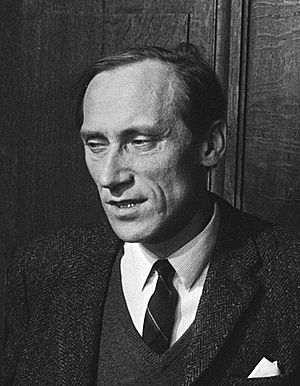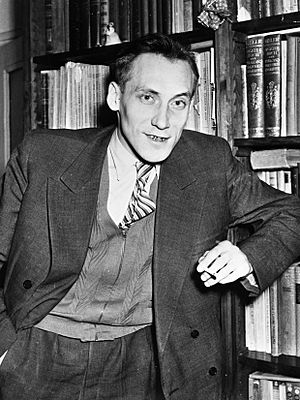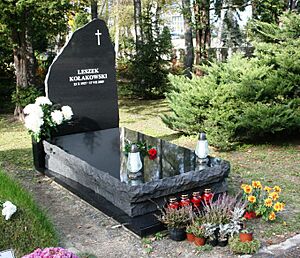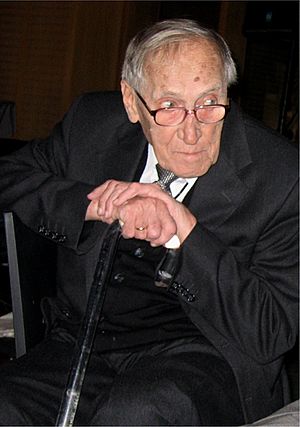Leszek Kołakowski facts for kids
Quick facts for kids
Leszek Kołakowski
|
|
|---|---|

Kołakowski in 1971
|
|
| Born | 23 October 1927 |
| Died | 17 July 2009 (aged 81) Oxford, England
|
| Education | Łódź University University of Warsaw (PhD, 1953) |
|
Notable work
|
Main Currents of Marxism (1976) |
| Awards | Peace Prize of the German Book Trade (1977) MacArthur Fellowship (1983) Erasmus Prize (1983) Kluge Prize (2003) Jerusalem Prize (2007) |
| Era | 20th-/21st-century philosophy |
| Region | Western philosophy
|
| School |
|
| Institutions | University of Warsaw |
|
Main interests
|
|
|
Notable ideas
|
Humanist interpretation of Marx Criticism of Marxism |
|
Influenced
|
|
Leszek Kołakowski (born October 23, 1927 – died July 17, 2009) was an important Polish philosopher and historian of ideas. A philosopher is someone who thinks deeply about big questions in life. A historian of ideas studies how different ways of thinking have changed over time.
Kołakowski is famous for his detailed studies of Marxism. Marxism is a set of ideas about how society should be organized, where everyone is equal and the government controls everything. His most well-known work is a three-book series called Main Currents of Marxism (1976). In his later years, Kołakowski also thought a lot about religious topics.
Because he openly criticized Marxism and the Communist state system, Kołakowski was forced to leave Poland in 1968. He then spent most of his career teaching at All Souls College, Oxford in England. Even though he was in exile, his ideas greatly inspired the Solidarity movement in Poland during the 1980s. This movement helped lead to the end of communist rule in Eastern Europe.
Kołakowski received many important awards. These include the MacArthur Fellowship and Erasmus Prize in 1983, the Kluge Prize in 2003, and the Jerusalem Prize in 2007.
Contents
Early Life and Education
Leszek Kołakowski was born in Radom, Poland. He grew up during a difficult time. During World War II, Poland was occupied by Germany (1939–1945). This meant he could not go to a regular school.
Instead, he read many books on his own and took private lessons. He even passed his school exams through an underground school system in Poland. After the war, he studied philosophy at the University of Lodz and the University of Warsaw. He earned his doctorate degree in 1953 from the University of Warsaw. His studies focused on the philosopher Baruch Spinoza.
From 1959 to 1968, Kołakowski was a professor at Warsaw University. He was also the head of the History of Philosophy department there.
From Communism to Critic
When he was young, Kołakowski became a communist. He was a member of the Polish United Workers' Party from 1947 to 1966. He was even sent to Moscow in 1950 because of his intellectual talent.
However, Kołakowski soon disagreed with Stalinism. Stalinism was a very harsh and controlling form of communism led by Joseph Stalin. Kołakowski became a "revisionist Marxist." This means he wanted to change and update Marxist ideas. He believed in a more humanist way of looking at Karl Marx's ideas. Humanism focuses on human values and dignity.
In 1957, Kołakowski wrote a four-part series that criticized Soviet Marxist ideas. He said that some of their ideas were just "truisms" (obvious truths) or "philosophical dogmas" (beliefs that can't be proven). He also said some were "nonsense."
After giving a public lecture at Warsaw University, he was removed from the Polish United Workers' Party. In 1968, he lost his job at the university and could not find another teaching position in Poland.
Exile and Major Works
Kołakowski realized that the harshness of Stalinism was not just a mistake. He believed it was a natural outcome of Marxism itself. He explored this idea in his most important work, Main Currents of Marxism. This huge book was published between 1976 and 1978.
He also became more interested in how religious ideas shaped Western culture and modern thought. For example, he looked at how ancient ideas influenced later thinkers like Hegel.
In 1968, Kołakowski became a visiting professor at McGill University in Canada. In 1969, he moved to the University of California, Berkeley. Then, in 1970, he became a senior researcher at All Souls College, Oxford in England. He stayed mostly at Oxford. He also taught part-time at the University of Chicago from 1981 to 1994.
Even though his books were banned in Poland, copies were secretly passed around. His ideas influenced many Polish intellectuals who opposed the communist government. His 1971 essay, Theses on Hope and Hopelessness, suggested that people could form their own groups to slowly gain more freedom in a totalitarian state. A totalitarian state is one where the government has total control over people's lives. This essay helped inspire the Solidarity movement in the 1970s.
The Solidarity movement was a large, peaceful movement that fought for workers' rights and democracy in Poland. It eventually helped bring down communist rule in Eastern Europe in 1989. In the 1980s, Kołakowski actively supported Solidarity by giving interviews, writing, and raising money.
Kołakowski always had his own unique view of Marxism. He argued against the way political leaders used Marxist ideas. He believed his interpretation was the correct one.
In Poland, Kołakowski is seen as a great philosopher and historian. He is also a symbol for those who opposed communism. He died on July 17, 2009, in Oxford, England, at the age of 81.
Awards and Recognition
Leszek Kołakowski received many important awards for his work. In 1986, the National Endowment for the Humanities chose him to give the Jefferson Lecture. This is one of the highest honors for achievement in the humanities in the United States. His lecture was called "The Idolatry of Politics."
In 2003, the Library of Congress gave Kołakowski the first-ever John W. Kluge Prize for Lifetime Achievement in the Humanities. This award recognizes deep understanding in fields like history, philosophy, and languages.
Other awards he received include:
- Jurzykowski Prize (1969)
- Peace Prize of the German Book Trade (1977)
- Erasmus Prize (1983)
- MacArthur Fellowship (1983)
- Order of the White Eagle (1997) - This is Poland's highest honor.
- Jerusalem Prize (2007)
See also
 In Spanish: Leszek Kołakowski para niños
In Spanish: Leszek Kołakowski para niños
- Agnieszka Kołakowska, his daughter
- Zygmunt Bauman
- Adam Schaff
- History of philosophy in Poland
- List of Polish people – philosophy
- Poles in the United Kingdom




